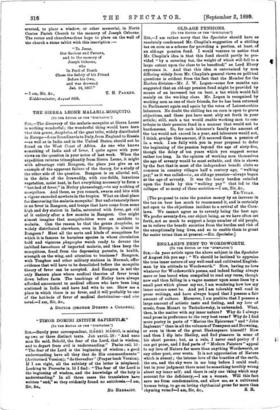OLD-AGE PENSIONS.
[To THE EDITOR OF THE "SPECTATOR,"] SIR,—I am rather sorry that the Spectator should have so resolutely condemned Mr. Chaplin's suggestion of a shilling tax on corn as a scheme for providing a portion, at least, of an old-age pension fund. I would venture to notice that Mr. Chaplin's idea is that this fund should partly be pro- vided "by a covering tax, the weight of which will fall to a large extent upon the class to be benefited," as Lord Ebury expresses it. And that this idea is entertained by men differing widely from Mr. Chaplin's general views on political questions is evident from the fact that the Member for the Harbro division—Mr. j. W. Logan—some few months ago suggested that an old-age pension fund might be provided by means of an increased tax on beer, a tax which would fall mainly on the working class. Mr. Logan is recognised by working men as one of their friends, for he has been returned to Parliament again and again by the votes of Leicestershire labourers. No doubt the shilling tax on corn is open to grave objections, and these you have most ably set forth in your article; still, such a tax would enable working men to con- tribute to their pension fund in a manner that would not be burdensome. So, for each labourer's family the amount of the tax would not exceed 5s. a year, and labourers would not, I think, grudge this amount, if it secured them a pension of 5s. a week. I am fully with you in your proposal to defer the beginning of the pension beyond the age of sixty-five, though the delay of ten years which you suggest seems rather too long. In the opinion of working men themselves the age of seventy would be most suitable, and this is shown by the fact that in most of the independent benefit clubs so common in country villages half a century ago, "walking pay," as it was called—i.e., an old-age pension—always began at the age of seventy. It was the heavy burden entailed upon the funds by this "walking pay" that led to the collapse of so many of these societies.—I am, Sir, &c.,
Ex-VICAR.
[The proposal to raise the pension money by an increase in the tax on beer has much to recommend it, and is certainly not open to the objections incident to a revival of the Corn- laws. We cannot agree as to seventy being the best age. We prefer seventy-five, our object being, as we have often set
forth, not so much to support a large number of old people, as to relieve the benefit societies from the burden and risk of the exceptionally long lives, and so to enable them to grant far easier terms than at present—En. Spectator.]


































 Previous page
Previous page